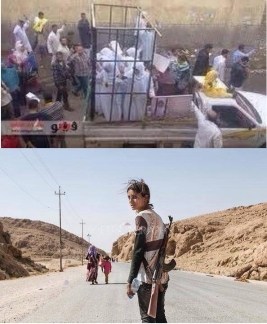Kobane, though located at the border with Turkey, is the heart of Rojava (Syrian Kurdistan). The recent events in Kobane have drawn global attention and have put Turkey’s role in the conflict under criticism.
Kobani is also called ”Ain El Arab” in Arabic because of the Arabisation process under the Baathist regime. The population is mainly Kurdish with minorities of Arabs, Assyrians and Turkmens. Since the start of civil war the Democratic Union Party of Syria has had the control of the town, the group called PYD in Kurdish is closely affiliated with PKK in Turkey, hence not favoured by the Turkish government.
The Islamic State militants, after advancing extensively in Sunni populated areas in Iraq and then not being able to advance in Autonomous region of Kurdistan in Iraq and suffering severe defeats from the Peshmarga Kurdish forces there, planned to attack the Syrian Kurdistan and control the strongholds of YPG/YPJ (People’s Protection Units) which is the military wing of PYD. Currently, the town of Kobane is surrounded by the Islamic State militants from three sides and Turkey on the fourth side. Turkey has allowed the safe passage of civilians to Turkey (which should not go unappreciated) but hesitates to allow Kurds from Turkey to join forces with YPG/YPJ in the town and help defeat the Islamic State militants. Furthermore, it is believed that the Islamic State militants get reinforcement and funds through Turkish soil and the Turkish government is keeping a blind eye on it. Even though it is a hugely debatable issue, there are quite a few facts supporting the claims.
The Kurdish people have taken to the streets around the world in the last few days and are demanding for a neutral role of Turkey in the conflict and are asking the Turkish government to allow the passage of Kurdish fighters to Kobane. However, the global media has been narrating it differently and are giving the message that the Kurds want involvement of Turkey in the conflict, which is utterly not true. It is understandable that getting involved in the conflict is not an option for Turkey yet, but Turkish involvement in supporting the Islamic State is unacceptable. Continue reading

